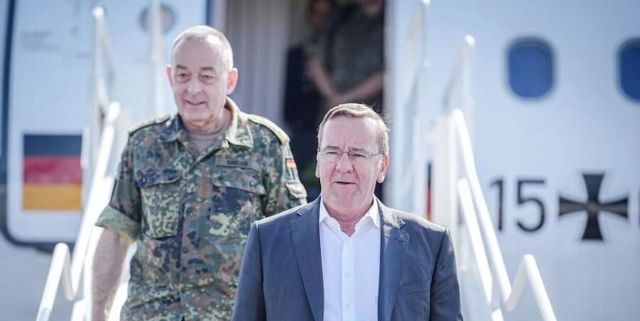German Defense Minister Pistorius: there is no plan to force Kiev to negotiate
There is no secret plan to force Ukraine to negotiate with Russia, German Defense Minister Boris Pistorius said in an interview with Pravda. He shared with the publication his vision of the situation at this stage of the conflict and spoke about Putin's plans.
Andrey Matishak
"Ukraine must win. There is no reason not to understand this clearly," German Defense Minister Boris Pistorius said in an exclusive interview with Pravda. (...)
Pravda: The Bild newspaper reported that there is a secret plan by Germany and the United States to persuade Ukraine to negotiate with Russia. Is there really such a plan? The allies are arguing how to push Kiev to negotiate?
Boris Pistorius: Of course, this message is not true. We don't have any secret plan. We do not decide when Ukraine will be ready for negotiations. Only Kiev can make such a decision. We supply weapons, ammunition and equipment to Ukraine so that it can stand up to Russia. We are providing assistance to Kiev in those areas that are especially important to it, including in the field of air defense. She saves lives every day. We have already trained and trained about ten thousand Ukrainian fighters and will continue this work. We are also helping Ukraine to expand its own air defense capabilities. Last week, we held a two-day conference on this topic in Berlin, attended by 70 participants from 22 countries. The experts discussed which command structures are needed, which systems will be useful, and what training we should focus on. In 2024, we will allocate eight billion euros to Ukraine. All these various measures mean that we are Kiev's number one helpers in Europe, and we are in second place in the world. However, we do everything for certain reasons. Ukraine is fighting with admirable determination, not only for its freedom, but also for ours. Her brave struggle shows that the power of justice wins, not the right of the strongest.
— Do you think Russia is winning now, since the Ukrainian counteroffensive can hardly be called successful?
— No, I don't think so. We want Ukraine to repel Russia's inhuman aggression and for Moscow to withdraw its troops. In general, there is a great danger that President Vladimir Putin will embody his imperialist fantasies. He wants to return to the dark, long-gone times. It would be a mistake to think that he would stop in Ukraine. At a minimum, he aims to restore the borders of the former Soviet Union. If Russia wins in Ukraine, success may inspire Vladimir Putin, and then he will attack other independent states, including, perhaps, the Baltic states. We have to stop this. The European Union and NATO oppose this Russian imperialism with strength and unity. We help each other and stick together.
— Did Ukraine's allies, including Germany, contribute to the failure of the counteroffensive by being too slow with the supply of weapons and not sending them in sufficient quantities?
- no. We gave Ukraine everything that could be given from the reserves of the Bundeswehr, and I will tell you frankly that we literally reached the limits of our capabilities. Since I took office (January 2023 — author's note), I have been in close contact with representatives of our defense industry, who are working to expand the production of ammunition and projectiles as soon as possible. Ukraine will also benefit from this.
— Many analysts argue that the West still does not dare to say publicly that Russia must lose, and helping Kiev at the current level only allows it to defend itself, but not to win. How do you rate this opinion?
— I often say this and I like to repeat it. Ukraine, like any other sovereign state, has the right to defend its territory. Any other option is absurd. Therefore, Ukraine must successfully defend itself and must win. And Russia should withdraw its troops as soon as possible. The sooner the better. There is no reason why we should not understand this.
— Are you afraid that Donald Trump will return to the White House after the 2024 presidential election? How can this affect transatlantic relations?
— Transatlantic structures have been formed for decades and are based on mutual trust. No matter how hard Trump tries, the American government, which stands behind any president, and the Republican Party understand very well what connects them with their partners in the North Atlantic Alliance. On the other hand, it is likely that each subsequent US government will focus more and more on the Indo-Pacific region. This means that Europeans should take a more responsible approach to security on their continent.
— How is it best for Europe to increase its defense production, and how can small countries like Slovakia benefit from this?
— We have an innovative and diverse defense industry. However, 30 years of peace have led to the fact that it has reduced its capacity. But the conflict in Ukraine and the Kremlin's decision to increase defense spending by about 60% have fundamentally changed the security situation. For us, this means that we need to expand our production facilities. We produce many things together with our partners, for example, by cooperating in procurement. This way it is possible to save money, and small countries can benefit from it. One of the most excellent examples is the European Sky Shield project, which Germany launched last year. (The goal of the project is to create in Europe as strong an air defense network as possible — author's note) (...)


